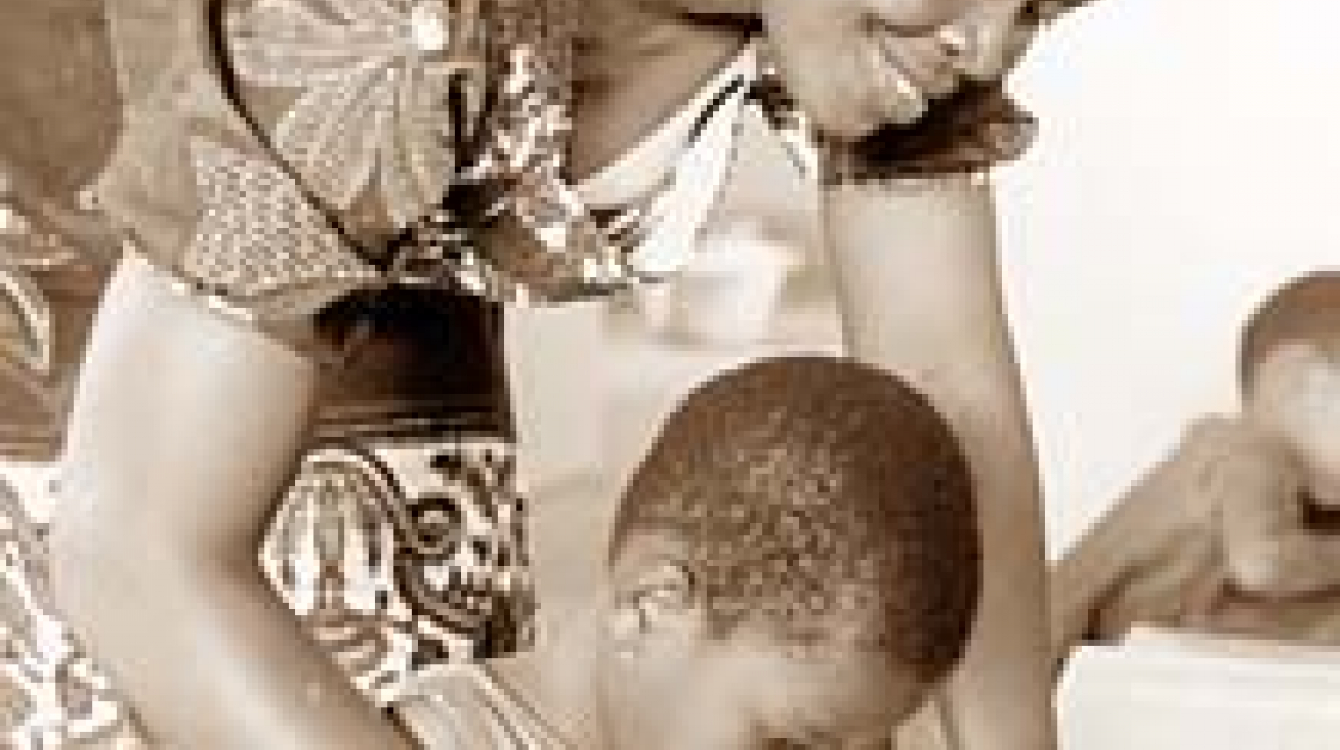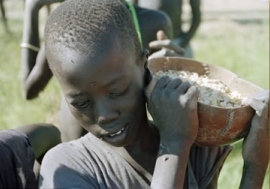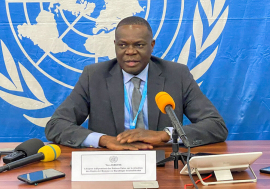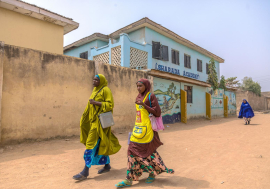'Gender budgets' seek more equity
'Gender budgets' seek more equity
"If you want to see which way a country is headed," said South African parliamentarian Ms. Pregs Govender, "look at the country's budget and how it allocates resources for women and children." Ms. Govender is among a growing number of African parliamentarians, finance ministry officials and non-governmental women's rights activists who are doing just that -- analyzing government spending choices for their impact on women and seeking greater equity in budget allocations with the help of an innovative approach to understanding public spending known as "gender responsive budget analysis."
Gender budgeting is a method of analysis used to highlight differences in public spending on men and women. It looks not only at funding levels for the various ministries, but also at spending priorities within ministries. A gender budget analysis, for example, might find that cuts in spending on agriculture fall most heavily on poor women farmers. Restoring the agriculture budget could increase household incomes, raise agricultural production and improve the quality of life for all villagers. By permitting better-targeted and more efficient use of government resources, advocates argue, gender budgeting benefits men and women alike. To date, three African countries -- South Africa, Tanzania and Uganda -- have analyzed their budgets for gender impact.
"Your budget decisions really show your policy priorities," Ms. Govender told Africa Recovery. "You can say your priority is poverty, but it's your budget decision that shows whether that priority is matched by spending." Fighting poverty and redressing the racial inequities of the past are priorities in post-apartheid South Africa, she noted, and are supposed to affect all activities of government. Black women in South Africa are at the very bottom of the socio-economic ladder. Their interests are affected by virtually all government spending, not just the fraction of the budget allocated for programmes intended specifically for women.
"Your budget decisions really show your policy priorities. You can say your priority is poverty, but it's your budget decision that shows whether that priority is matched by spending."
-- Ms. Pregs Govender, South African MP
"We are not asking for a separate 'women's budget,'" she said. "You are looking at all your spending and asking 'how does it address these national priority problems?' What are the priorities in terms of women?' We have to look not just at the choices at the macro-economic level, but at the departmental level and within departments at the choices between programmes and within programmes."
Rigorous analysis
Gender budgeting was originally developed by feminist economists in Australia in 1984 and taken up by women's rights activists in South Africa's first democratic parliament a decade later. Ms. Govender, then a newly elected member of parliament (MP), was among them. "I proposed [in 1994] that South Africa develop a gender budget and use the example of the Australian women's budget," said the long-time anti-apartheid and feminist leader. The following year, she and other members of the Finance Committee launched South Africa's first gender budget exercise, the Women's Budget Initiative (WBI).
Parliamentary support has given the WBI significant political weight within government, but it is rigorous economic research and analysis that drives the process itself. Collecting the necessary information, however, was difficult. Apartheid-era ministries and economists rarely bothered to collect gender-specific data. South Africa's post-apartheid parliament, like other African legislatures, lacked its own research capacity, leaving it dependent on the finance ministry for information and interpretation. "The first year I was in parliament," Ms. Govender recalled, "I shared a secretary with about 60 other MPs and had no researcher."
Forging alliances
The solution to the information gap was found in civil society. Two non-governmental organizations (NGOs), the Community Agency for Social Enquiry (CASE) and the Institute for a Democratic Alternative in South Africa, have been parliament's principal partners in the WBI and have coordinated almost all of the project's research and analysis.
The alliance of civil society groups and MPs is one of the WBI's greatest strengths, argues CASE researcher Debbie Budlender. "The non-governmental organizations have been able to provide the expertise and time necessary to collect information, undertake the research and produce the analysis. The parliamentarians have provided access to information and focus in terms of key political issues." Without an effective presence within government, "the analysis might well have remained to gather dust on the shelves or been used only within a closed circle of gender activists."

More budgetary resources for basic education can benefit all children, not just girls.
Photo : ©United Nations / B. Wolff
In its first year, the WBI examined the budgets of six ministries. Since then WBI researchers have expanded their focus to the full national budget and the budgets of the country's nine provinces. They have identified many instances of gender bias and inefficiency in public spending. In 1995, for example, WBI found that, although 20 per cent of adult South African women and 16 per cent of the men were illiterate, just 1 per cent of that year's education budget was allocated to adult basic education. WBI analysts argued that the funding was inadequate and disadvantaged both men and women.
A review of the 1997 budget for public works found that one rural job creation and skills training programme run by the Department of Water Affairs and Forestry hired women for slightly more than half the new jobs created. A similar programme administered by the same ministry in another part of the country, however, hired women for just 14 per cent of the vacancies. WBI analysts also found that the programme tended to hire women for the lowest paid and least skilled positions -- a problem not limited to public works. Overall, they reported, women occupied just 27 per cent of management positions in the national government and 38 per cent in provincial administrations.
Strength in numbers, vision
Despite the potential for occasional political embarrassment, say WBI activists, the South African government's response to the women's budget exercise has been positive. One of the reasons, said Ms. Govender, has been the election of women to almost 30 per cent of seats in the post-apartheid parliament. In the past, she noted, "the budget was designed by white men for white men, and the spending reflected that." Devising a budget for all of South Africa's people, she continued, turned parliament into a laboratory for new approaches like gender budgeting. "It is critical that we have a significant number of women [MPs], because it creates the space for these sorts of things to be raised. It changes the culture immediately. Otherwise you have huge pressure on a small number of women to conform to the dominant male culture."
But numbers alone, cautioned the legislator, were not sufficient for the adoption of gender budgeting and other pro-poor policies. "A large number of the women coming into parliament were active in the struggle against apartheid," she noted. "We started from a vision ... of a society in which basic needs are met, where there is work and dignity, where every person has the ability to develop to their fullest." Far from being labelled a special interest group, Ms. Govender observed, the WBI was widely understood as one strategy among many for social transformation. "That is critical to how successful we have been."
The fact that women occupy positions of power in parliament and government has also been important, she continued. Not only has the speaker of parliament, Ms. Frene Ginwala, been a strong supporter of gender budgeting, she noted, another veteran anti-apartheid and women's activist, Ms. Gill Marcus, chaired the Finance Committee when it first took up the WBI in 1995 and now serves as deputy minister of finance. "It is important to have women in significant places."
Support for the WBI within the ruling African National Congress was strong enough in 1998 that the finance minister pledged to incorporate gender budgeting methods into the government budgeting process -- a commitment that has since been withdrawn. That setback was a reminder that "opposition hasn't just come from old-guard apartheid types," Ms. Govender laughed. "Opposition comes very much from some [anti-apartheid] comrades in government who are dismissive of us." But in general, she concluded, the WBI has proven to be a big success, not least because "throughout the country people are talking about women and the budget in a way that you never heard before we started this. People ask 'how does this impact poor women?' It is a question that is raised straight through, and it is linked to women's struggles. That is the biggest impact."
Tanzanian women 'demystify' the budget
With help from the UN Development Fund for Women (UNIFEM), gender budgeting is spreading to legislators and women's rights advocates in other countries. Tanzanian activists began examining the national budget in 1997, explained Ms. Mary Rusimbi, executive director of the Tanzanian Gender Networking Programme, following a UNIFEM regional workshop on women and budgeting.
"The first thing we discovered is that we as women, and the public in general, hardly knew how the budget was made and how the government budget machinery worked. We used [the gender budget campaign] as one important opportunity to learn about the budget and demystify it for the public." Most Tanzanians thought of the budget as something for government only, she continued. "We explained that the budget is about people issues and the allocation of public resources that had to touch on men's and women's needs. We addressed how it is made and what the process is, and we found it was top-down, too technical and also male-dominated."
In 1997, a group of Tanzanian MPs, researchers, NGOs and government officials formed the Feminist Activism Coalition (FEMACT), which organized workshops about the gender budgeting process for government and civil society leaders. It was largely a non-governmental initiative at that point, Ms. Rusimbi told Africa Recovery, intended to build awareness and support. The breakthrough came in 1999, when the government invited FEMACT to assist with the inclusion of gender budget techniques in the official budget guidelines for planners. The government followed up with a request for formal training on gender budgeting.
In 2000 FEMACT was commissioned by the finance ministry to analyze six key sectors of the national budget -- health, education, water, agriculture, women and children's affairs, and regional and local government. In contrast to the South African experience, which relies almost exclusively on NGO analytical expertise, Tanzanian research teams typically consisted of academics, NGOs and government representatives working together. "In health," Ms. Rusimbi explained, "our research found that a lot of money allocated for women's health issues -- breast cancer, pregnancy and the like -- wasn't reaching the people. So we reported that, and I'm glad to say the government has taken it up. They have a ways to go but they are trying to push more money into women's health."
But because of poverty, she noted, the government's capacity to raise revenue is very limited. Its ability to adjust spending priorities within the budget is equally restricted, she noted, by conditions attached to development assistance by donor states and the International Monetary Fund and World Bank. "The support the government is getting from global institutions like the World Bank is very constraining. A lot of instructions come from them which are kind of anti-progressive towards women and men." One such programme, she asserted, forced the government to withdraw subsidies for small farmers, the great majority of whom are poor women. "Women, children and even poor men are suffering. These policies are not analyzed with a gender perspective."
UNIFEM Executive Director Noeleen Heyzer agrees. Addressing the Financing for Development conference in Monterrey, Mexico, earlier this year, she praised gender budgeting as an effective policy tool. "I would like to call for gender budget analysis to be applied to official development assistance within the international financial institutions as well as among donor countries."
Educating the public
Despite these difficulties, Ms. Rusimbi said, Tanzania's gender budget initiative has already succeeded in changing the way budgets are made and in educating the public about their right to participate. "This is the right of the different stakeholders to have at least economic literacy [so that] women as much as men are going to benefit and to contribute. It is a development issue."
Ugandans focus on local government
Uganda's experience with gender budgeting began in 1999 with assistance and support from UNIFEM. Like its South African and Tanzanian counterparts, the Ugandan gender budget initiative is driven by a coalition of women's rights and advocacy groups, parliamentarians and government finance and development ministry officials.

Women must be more involved in analyzing budgets, says Ugandan MP Winnie Byanyima .
An early target of the initiative, explained Ugandan MP and gender budget advocate Ms. Winnie Byanyima, was the budget process itself. "It was very exclusive. Even parliament was only coming in at the tail end. It was an unimportant player in the budget. We got parliament to pass an act giving itself a role in the earliest stages of budget formation." In that sense, she noted, "we've been part of the advocacy towards democratizing the budget process."
Unlike other gender budget exercises, however, local government budgets were an early focus for the coalition, since many government services are delivered locally. In the health sector, Ms. Byanyima noted, "We brought out the fact that 60 per cent of all government health resources were going to the national teaching hospital. Now we see a better division of those resources."
Spending on agriculture, she continued, was little better. "Mostly it was being spent on the male bureaucrats in the capital. It was not being spent to give women the tools and the knowledge to improve production or reduce the drudgery. Almost no resources at all were reaching poor women and poor men in the rural areas."
The government's strong commitment to primary education has seen a significant increase in school spending (see Africa Recovery, July 2000). But the special problems that force girls out of school, she said, are not being addressed locally "because there is no budget. So we've been advocating for these issues at community level." Part of the advantage of focusing on local government, Ms. Byanyima said, is that "we have been able to look and compare how much money is spent on the bureaucracy, as opposed to how much is actually spent on programmes for rural people. This usually comes as a shock."
Such criticisms initially got a hostile reception from parliamentary and government officials, she observed, but attitudes have slowly changed. This is partly due to what she termed "a cautious, deliberate policy by government" to promote greater gender equity, but also because nearly one in four MPs are women. That, Ms. Byanyima said, has helped keep gender budgeting on the national agenda.
Political mobilization needed
But with Uganda's gender budget exercise only entering its third year, Ms. Byanyima said, there is still a lot of political mobilization to do. "What we've managed to do so far is make this small group [of activists] a bit more expert in understanding the budget, but I don't think we've been successful in agitating the public about budget issues. That's a big job that more people have to get involved in."
Ultimately, she concluded, both government and parliament need to develop the institutional capacity to do effective planning for men's and women's different roles in society and direct public spending towards greater equity. "Once we start building those capacities, then we are on the road to achieving."
















